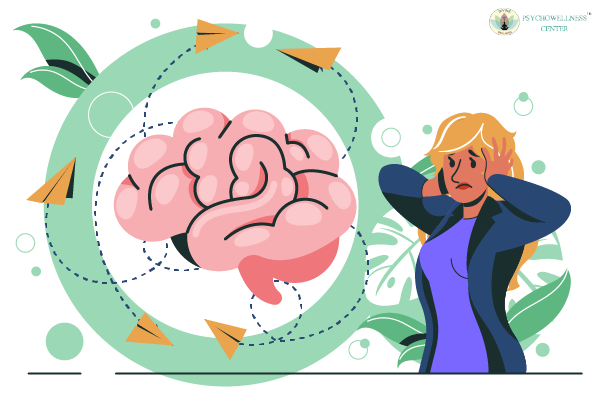Major Neurocognitive Disorder (MNCD), commonly known as dementia, is a significant decline in cognitive function that affects daily life and independence. It encompasses various forms, including Alzheimer’s disease, which is the most prevalent type. For early intervention and management, it is essential to comprehend the symptoms, causes, and available treatments for MNCD.
Signs of Major Neurocognitive Disorder
Recognizing the early signs of MNCD is vital for timely diagnosis and treatment. Common symptoms include:
- Memory Loss: One of the hallmark signs is forgetfulness, especially of recent events or important information. Individuals may misplace items or struggle to remember conversations.
- Difficulty with Language: People may experience trouble finding the right words, forming sentences, or following conversations, leading to frustration.
- Disorientation: Individuals may become confused about time, place, or even their own identity. They could have trouble identifying faces or places they are familiar with.
- Impaired Judgment: Poor decision-making abilities can emerge, affecting personal finances or everyday tasks. Individuals might exhibit decreased insight into their condition.
- Changes in Mood and Personality: Mood swings, anxiety, depression, and personality changes can occur. Individuals may become withdrawn, exhibit low motivation, or show signs of loneliness and isolation.
- Difficulty with Daily Activities: As the disorder progresses, managing everyday tasks such as cooking, grooming, and self-care becomes increasingly challenging.
Causes of Major Neurocognitive Disorder
Understanding the underlying causes of MNCD can help in its prevention and treatment. Key factors include:
- Alzheimer’s Disease: The buildup of tau tangles and amyloid plaques in the brain is a hallmark of Alzheimer’s disease, the primary cause of MNCD. Usually, it starts out slowly and gets worse with time.
- Vascular Issues: Conditions affecting blood flow to the brain, such as strokes or chronic high blood pressure, can lead to vascular dementia, a form of MNCD.
- Trauma: Head injuries or traumatic brain injuries can increase the risk of developing cognitive disorders later in life.
- Genetic Factors: A family history of dementia or certain genetic markers can elevate the risk of developing MNCD.
- Chronic Conditions: Health issues such as diabetes, cardiovascular disease, and obesity may contribute to cognitive decline.
- Mental Health Factors: Anxiety and depression can also exacerbate cognitive decline, leading to a cyclical effect where cognitive issues further worsen mental health.
Impact on Mental Health
Living with Major Neurocognitive Disorder can significantly impact an individual’s mental health. Many experience feelings of stress, loneliness, and isolation as their condition progresses. The emotional toll can lead to anxiety and depression, further complicating their overall well-being. Low motivation and self-esteem often accompany cognitive decline, making it essential for caregivers and loved ones to provide support and encouragement.
Treatment Options for Major Neurocognitive Disorder
While there is currently no cure for Major Neurocognitive Disorder, several treatment approaches can help manage symptoms and improve quality of life:
- Medications: Certain medications, such as cholinesterase inhibitors and memantine, may help manage symptoms of Alzheimer’s disease and other forms of MNCD. These drugs can improve memory, cognition, and daily functioning.
- Therapeutic Interventions: Engaging in cognitive training and rehabilitation can help individuals maintain cognitive abilities for longer. Activities that stimulate the mind, such as puzzles and memory games, can be beneficial.
- Lifestyle Changes: Encouraging a healthy lifestyle that includes regular physical activity, a balanced diet, and social engagement can slow cognitive decline. Activities that promote physical health also support mental well-being.
- Psychological Support: Therapy can be invaluable for individuals and their families. counselling options, like those provided by TalktoAngel, can offer accessible mental health support. Finding the best psychologist in India can help individuals cope with the emotional aspects of MNCD, addressing issues like anxiety, depression, and low self-esteem.
- Support Groups: Joining support groups for individuals with MNCD and their families can provide emotional support and practical advice. Feelings of loneliness can be lessened by talking about experiences with people going through comparable difficulties.
- Caregiver Support: Training and support for caregivers are essential, as they play a critical role in the individual’s daily life. Caregiver stress can lead to burnout, making it vital for them to also seek help and respite.
Coping Strategies for Individuals and Caregivers
For individuals diagnosed with MNCD, developing coping strategies is crucial. Here are some suggestions:
- Stay Engaged: Participating in social activities, hobbies, and routines can help maintain cognitive function and improve mood.
- Practice Mindfulness: Techniques such as meditation and mindfulness can reduce anxiety and promote emotional well-being.
- Realistic Goals Setting: Focusing on achievable tasks can enhance motivation and provide a sense of accomplishment.
- Maintain Routine: Establishing daily routines can provide structure and reduce confusion.
- Communicate Openly: Encouraging open communication with family and friends can help reduce feelings of loneliness and foster supportive relationships.
- Seek Professional Help: Regular check-ins with a mental health professional can provide ongoing support, helping to address issues related to anxiety, depression, and emotional distress.
Conclusion
Major Neurocognitive Disorder is a complex condition that profoundly affects individuals and their families. Understanding the signs, causes, and treatment options is essential for managing this disorder effectively. By fostering awareness and providing appropriate support, individuals can improve their quality of life and maintain meaningful connections. Whether through online counselling, engaging with the best psychologist in India, or seeking resources like TalktoAngel, there are avenues available to navigate the challenges of MNCD. Early intervention, supportive relationships, and a focus on mental well-being can make a significant difference in the lives of those affected by this disorder.
Contribution:- Find mental health support with Dr. (Prof) R K Suri clinical psychologist and Ms. Gurleen Kaur. Expert Counselling psychologist offering clinical and counseling services near you.
References
- Post Views: 355

